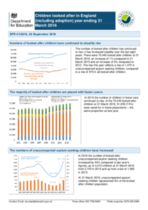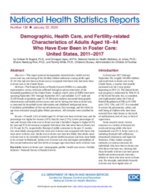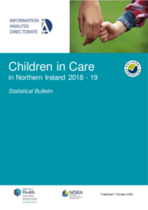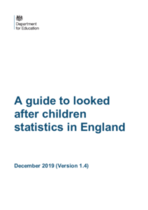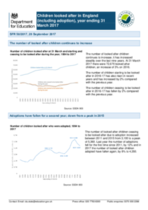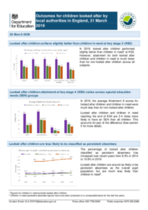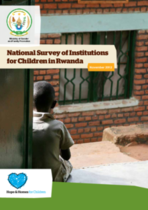Displaying 1 - 10 of 60
… in the number of adoptions dating back to 1995–96. Data cover characteristics of adopted children, their parents and … in the number of adoptions dating back to 1995–96. Data cover characteristics of adopted children, their parents and … in the number of adoptions dating back to 1995–96. Data cover characteristics of adopted children, their parents and …
… away from their placement without authorisation. Figures cover looked after children who were placed for adoption, the … away from their placement without authorisation. Figures cover looked after children who were placed for adoption, the … away from their placement without authorisation. Figures cover looked after children who were placed for adoption, the …
Abstract
Objective—This report presents demographic characteristics, health service access and use, and timing of key fertility-related milestones among adults aged 18–44 who had ever been in foster care as compared with those who had never been in foster care in the United States.
Methods—The National Survey of Family Growth (NSFG) is a nationally representative survey, with data collected through in-person interviews of the household population of the United States. Analyses used 6 years of NSFG interviews spanning September 2011 through September 2017, and included 11,527 male and 14…
This publication presents the latest figures on children and young people in care in Northern Ireland. The OC2 community information return is specifically designed to collect information on children while they are in care, expressly for those who have been in care continuously for 12 months or longer. Together with two additional returns, OC1, which collects information on educational attainment of care leavers aged 16 to 18, and OC3, which covers the circumstances of care leavers at the time of their 19th birthday 1 , they provide a comprehensive series of data on children and young people…
… includes non-maintained special schools, as we want to cover as many looked after children as possible. We publish … special schools and alternative provision, as we want to cover as many looked after children as possible. We publish … colleges and academies. From 2007, this was extended to cover maintained primary schools and special schools. Absence …
… away from their placement without authorisation. Figures cover looked after children who were placed for adoption, the … away from their placement without authorisation. Figures cover looked after children who were placed for adoption, the …
About this release
This statistical release provides national and local authority (LA) level information on the outcomes for children who have been looked after continuously for at least 12 months at 31 March 2019, by local authorities in England. LA level data is published for the local authority that looks after the child. LA level data is provided as underlying data only.
All figures are based on data collected annually through the children looked after return (also known as SSDA903) which is completed each spring by all local authorities in England. Further details on which children…
In March 2012, the Cabinet of the Republic of Rwanda approved the National Strategy for Child Care Reform. The aim of the strategy is to transform Rwanda’s current childcare and child protection system into a family-based, family-strengthening system whose resources (both human and financial) are primarily targeted at supporting vulnerable families to remain together. The strategy recognises that transformation of institutions (sometimes known as orphanages) is an entry point to building sustainable childcare and child protection systems. The first phase, estimated to take 24 months,…
This study commissioned by the Ministry of Gender, Children, and Community Development and financially and technically supported by UNICEF and the Better Care Network, aimed at describing the situation of children in institutional care and creating a database containing all institutions in Malawi catering for children requiring alternative care. Some of the scope of work the study covers including mapping out the institutions and counting the number of children being cared for, determining the registration status of institutions, documenting different types…
Background with rationale
The Scottish government collects data on Looked-after-children (LAC) from the 32 local authorities (LAs) in Scotland. Since 2008, the LAs have provided individual data on a yearly basis that covers every child who was looked after at any time during the year up to the Census date. These data have been linked to data on educational outcomes for these children. Cross-sectional analysis by the Scottish Government show that the educational outcomes for these children are much poorer than for other children in Scotland. This presentation will discuss methods to create…


